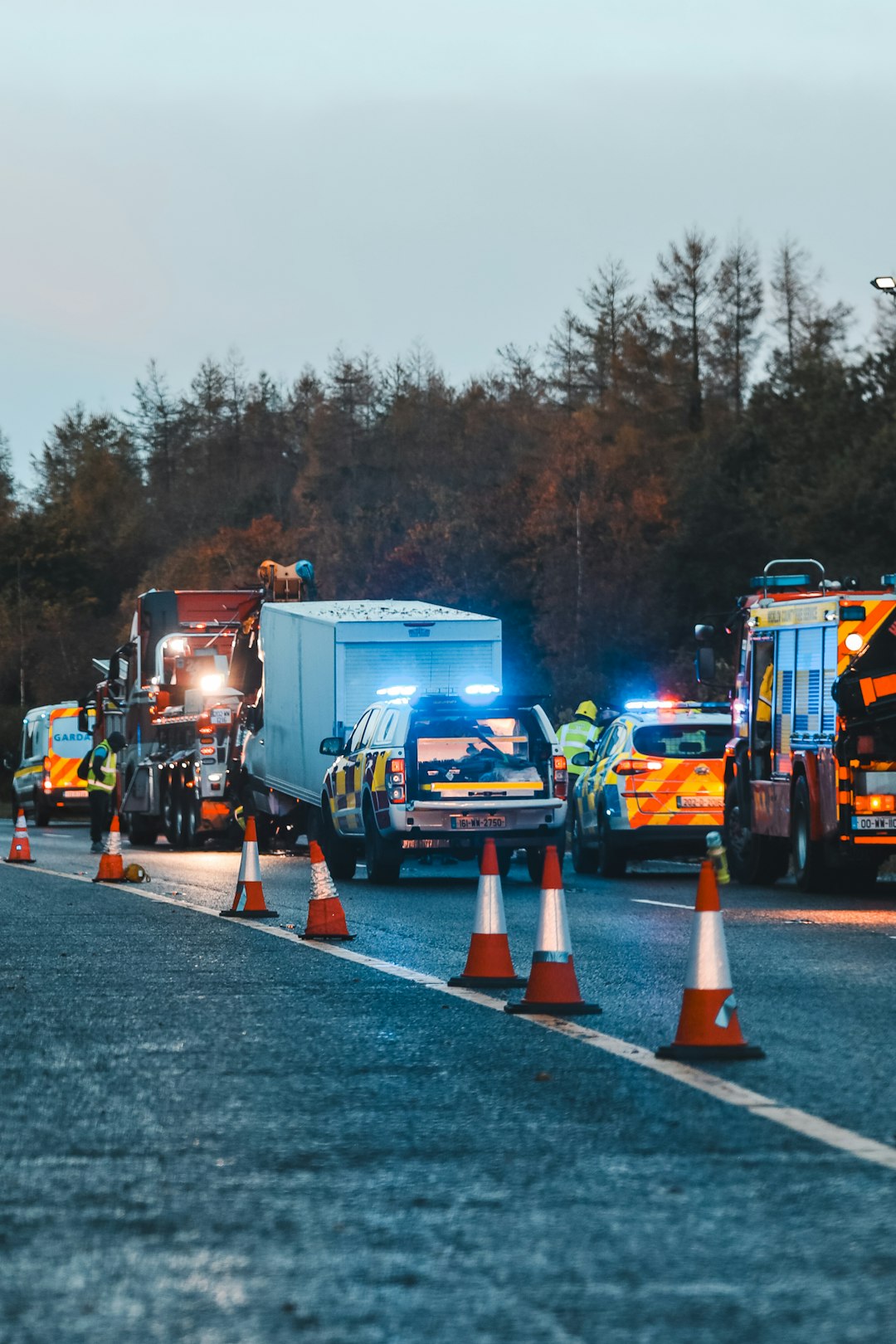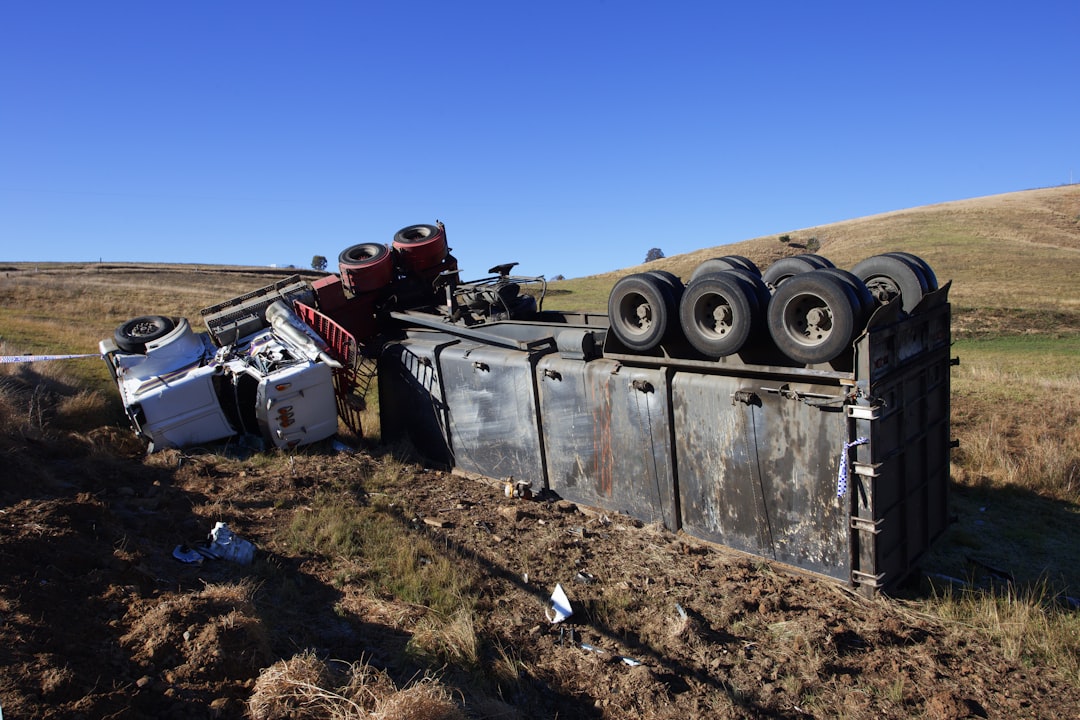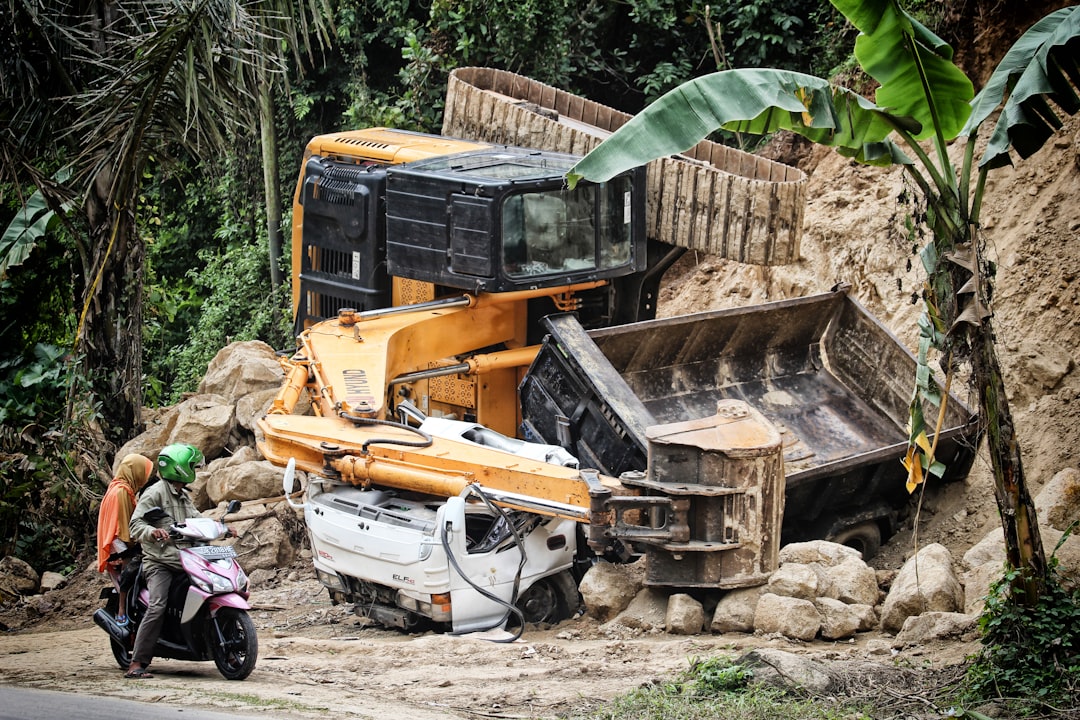

Truck accidents in California are an unfortunate and all-too-common occurrence, and understanding their root causes is crucial for both prevention and legal accountability. As a California truck accident law expert, I find that delving into the common causes of these incidents not only sheds light on the underlying issues but also helps victims seek justice effectively.
One of the primary causes of truck accidents in California is driver fatigue. The trucking industry often imposes demanding schedules that push drivers to their limits. Despite regulations set by the Federal Motor Carrier Safety Administration (FMCSA) aimed at curbing excessive driving hours, violations are not uncommon. Fatigued drivers can suffer from reduced reaction times, impaired judgment, and even fall asleep at the wheel, leading to catastrophic outcomes.
Another significant contributor is distracted driving. In our technology-driven society, distractions such as mobile phones, GPS systems, and even onboard entertainment can divert a driver's attention away from the road. Given the sheer size and weight of trucks compared to passenger vehicles, even a momentary lapse in concentration can result in devastating collisions.
Poor vehicle maintenance also plays a crucial role. Trucks require regular inspections and maintenance to ensure they are roadworthy. Faulty brakes, worn-out tires, and other mechanical failures can lead to loss of control or inability to stop in time-both scenarios that increase the risk of severe accidents.
Weather conditions cannot be overlooked either. California's diverse climate means that truckers may encounter everything from foggy coastal mornings to mountainous snowstorms within the same journey. Inadequate preparation for adverse weather conditions can turn treacherous roads into deadly hazards.
Lastly, improper loading practices contribute significantly to truck accidents. Overloaded trucks or those with improperly secured cargo can become unbalanced or experience load shifts while moving. This instability makes it difficult for drivers to maintain control during maneuvers or sudden stops.
Understanding these common causes is vital for multiple reasons: it aids in formulating preventive measures, informs public policy changes, and helps victims build stronger legal cases when seeking compensation. By addressing driver fatigue through better enforcement of existing regulations or leveraging technology like electronic logging devices (ELDs), we can reduce one major risk factor substantially.
Similarly, stricter penalties for distracted driving combined with public awareness campaigns could go a long way toward mitigating this issue. Regular vehicle maintenance checks mandated by law would help ensure trucks are safe before hitting the road.
In conclusion, tackling the problem of truck accidents in California requires a multifaceted approach involving regulation enforcement, public education, technological advancements, and stringent legal frameworks. By focusing on these common causes-driver fatigue, distracted driving, poor vehicle maintenance, adverse weather conditions, and improper loading-we stand a better chance of reducing these tragic events and making our roads safer for everyone.
When discussing California truck accident law, it's imperative to understand the key regulations that govern the trucking industry within the state. These regulations are designed to maintain safety on the roads, ensure fair practices in the transportation sector, and protect all road users from potential hazards associated with commercial trucking. As a California truck accident law expert, I will outline some of the primary regulations and their implications.
California's trucking industry is heavily regulated by both federal and state laws. At the federal level, the Federal Motor Carrier Safety Administration (FMCSA) sets forth regulations that apply nationwide. However, California has its own set of rules that are often more stringent than federal guidelines. The California Department of Transportation (Caltrans) and the California Highway Patrol (CHP) play significant roles in enforcing these standards.
One of the cornerstone regulations is outlined in Title 13 of the California Code of Regulations (CCR), which addresses various aspects such as vehicle maintenance, driver hours of service (HOS), and cargo securement. For example, under CCR Title 13 Section 1212(a), all commercial vehicles must undergo regular inspections to ensure they meet safety standards. This regulation helps prevent accidents caused by mechanical failures or improper vehicle upkeep.
Driver fatigue is another critical area governed by strict regulations in California. While the FMCSA mandates maximum driving hours and compulsory rest periods under its HOS rules, California may impose additional restrictions to further minimize risks associated with driver fatigue. Adhering to these HOS rules is crucial for preventing accidents caused by overworked or drowsy drivers.
Furthermore, weight limits and load restrictions are strictly enforced to maintain road safety and infrastructure integrity. Overloading a truck can lead to severe accidents due to compromised vehicle handling or brake failure. Caltrans regulates weight limits through weigh stations scattered across major highways where trucks are inspected for compliance.
In addition to these physical standards and operational practices, there are also stringent requirements regarding driver qualifications and training. Commercial drivers must obtain a Commercial Driver's License (CDL) specific to the type of vehicle they operate. They must also pass medical examinations conducted by certified medical examiners listed on FMCSA's National Registry.
Another essential regulation involves hazardous materials transportation within California borders. Transporting hazardous materials requires special permits issued by both state and federal authorities due to their potential danger if improperly handled or involved in an accident.
Violations of any trucking regulations can lead not only to hefty fines but also legal liabilities in case of an accident involving injuries or fatalities. In many personal injury claims arising from truck accidents in California, plaintiffs often allege negligence based on breaches of these regulatory standards by either truck drivers or trucking companies.
As an expert witness in truck accident cases, my role often involves scrutinizing whether there was non-compliance with any relevant regulation at the time of an incident-be it related to vehicle maintenance logs or adherence to HOS requirements-which could significantly impact liability determinations.
In conclusion, understanding key regulations governing trucking operations is crucial for anyone involved in or affected by this industry within California's jurisdiction-from operators ensuring compliance for safe transit practices down highways crisscrossing our Golden State; victims seeking justice post-accident; attorneys building robust legal strategies around statutory frameworks; right through investigators piecing together facts from collision scenes-all aiming towards safer roads shared harmoniously among diverse commuters alike!
When it comes to securing maximum compensation after a truck accident in California, the expertise of a top-tier lawyer can make all the difference.. Truck accidents often result in severe injuries and significant financial losses, making it imperative to have a knowledgeable advocate who can navigate the complexities of these cases.

Posted by on 2024-09-15
Navigating the labyrinthine world of legal proceedings following a truck accident in California can be an overwhelming experience.. The sheer complexity of the laws, coupled with the high stakes involved, necessitates a strategic approach guided by professional legal assistance.

Posted by on 2024-09-15
Maximizing Your Compensation: What to Expect from a Skilled Lawyer Facing the aftermath of a truck accident can feel like navigating through a nightmare, especially when it happens on the bustling highways of California.. The physical pain, emotional trauma, and financial strain can be overwhelming.

Posted by on 2024-09-15
Navigating the aftermath of a truck accident can be an overwhelming experience, especially when trying to understand your legal rights and responsibilities as a victim.. In California, the complexities of such cases often necessitate seeking legal assistance and representation to ensure you receive fair compensation and justice. Truck accidents frequently result in severe injuries and substantial property damage due to the sheer size and weight of commercial trucks.

Posted by on 2024-09-15
In the aftermath of a truck accident in California, one of the most crucial steps you can take is to keep detailed records of all related expenses.. This might seem like a tedious task during an already stressful time, but it can make a significant difference when dealing with insurance companies or pursuing legal action. First and foremost, capturing every detail helps ensure that you are fully compensated for your losses.

Posted by on 2024-09-15
Determining Liability in Truck Accident Cases: A California Perspective
California's bustling highways are a vital artery for commerce, but they also present significant risks, particularly when it comes to truck accidents. Determining liability in these incidents can be a complex process, requiring an intricate understanding of both state and federal regulations. As a California truck accident law expert, I aim to shed light on the key factors that influence liability in these unfortunate events.
First and foremost, it's essential to recognize that truck accidents often involve multiple parties. Unlike typical car accidents, where usually only the drivers involved are considered, truck accidents can implicate the trucking company, vehicle manufacturers, maintenance providers, and even cargo loaders. Each of these entities has specific responsibilities that could contribute to an accident if neglected.
One of the primary considerations in determining liability is whether there was a breach of duty by any party involved. For instance, trucking companies are responsible for ensuring their drivers are adequately trained and not overworked. They must comply with hours-of-service regulations designed to prevent driver fatigue-a leading cause of many truck-related accidents. Failure to adhere to these rules can result in the company being held liable for any ensuing damages.
Similarly, drivers themselves have obligations under California law and federal guidelines set forth by the Federal Motor Carrier Safety Administration (FMCSA). Drivers must maintain proper logs of their working hours and perform pre-trip inspections to ensure their vehicles are roadworthy. If a driver neglects these duties or engages in reckless behavior such as speeding or driving under the influence, they may be found personally liable.
Vehicle maintenance is another critical aspect often scrutinized in truck accident cases. Trucks undergo tremendous wear and tear due to their size and the heavy loads they carry. Regular maintenance checks are mandatory to keep these vehicles safe on the road. If a faulty brake system or worn-out tires contributed to an accident because they were not properly maintained or replaced by either the trucking company or a third-party service provider, those parties might bear responsibility.
Cargo loading practices also come under examination during liability assessments. Improperly secured or overloaded cargo can drastically affect a truck's handling and stability, increasing the likelihood of an accident. In such cases, whoever was responsible for loading the cargo-whether it's another branch within the trucking company or an external entity-could be deemed liable.
It's worth noting that California follows a comparative negligence system when it comes to personal injury claims arising from vehicle accidents. This means that liability can be shared among multiple parties based on their respective degrees of fault. Even if you were partially at fault for your own injuries in a truck accident, you could still recover damages proportional to your level of responsibility.
In conclusion, determining liability in truck accidents within California involves meticulous investigation into various facets including driver conduct, corporate practices by trucking companies, vehicle maintenance records, and cargo handling procedures. Given this complexity, victims seeking justice typically benefit from consulting experienced legal professionals who specialize in this area of law. By doing so, they can ensure all potential avenues for liability are thoroughly explored and appropriately addressed.
Gathering Evidence and Documentation: A Cornerstone in California Truck Accident Law
In the complex realm of California truck accident law, the importance of gathering evidence and documentation cannot be overstated. When a collision involving a large commercial vehicle occurs, the ramifications can be life-altering, not only for the victims but also for their families. Ensuring that justice is served hinges significantly on the quality and comprehensiveness of the evidence collected.
Truck accidents often result in catastrophic injuries due to the sheer size and weight of these vehicles. Determining liability in such cases can be intricate, involving multiple parties including drivers, trucking companies, manufacturers, and sometimes even government entities. The initial step towards unraveling this complexity begins at the accident scene where immediate documentation can capture critical elements that may otherwise be lost over time.
Photographs and videos from the crash site provide a visual record that can reveal important details such as road conditions, weather impacts, vehicle positions, skid marks, and damage extent. These visual cues offer invaluable support when reconstructing how events unfolded leading up to the accident. Additionally, witness statements captured promptly after the incident tend to be more reliable as memories tend to fade or become distorted over time.
Beyond on-scene evidence, there are various other forms of documentation essential in truck accident cases. The driver's logbooks and electronic logging devices (ELDs) provide insights into whether federal regulations concerning rest periods were adhered to-a common factor in many accidents caused by driver fatigue. Maintenance records of the truck involved can uncover potential mechanical failures or neglected upkeep that could have contributed to the incident.
Furthermore, obtaining data from onboard systems such as Electronic Control Modules (ECMs) or "black boxes" similar to those used in airplanes can present hard evidence about speed patterns, brake usage, and other driving behaviors immediately before a crash. This digital footprint is often pivotal in establishing fault or exonerating parties wrongfully blamed.
Medical records also play an instrumental role by documenting injuries sustained by victims and linking them directly to the accident. These records form the basis for calculating fair compensation covering medical expenses, rehabilitation costs, lost wages due to inability to work, and even non-economic damages like pain and suffering.
When it comes to litigation or settlement negotiations in California truck accident cases, meticulously gathered evidence strengthens an attorney's position markedly. It provides leverage against insurance companies who might otherwise downplay claims or exploit ambiguities for their benefit. Effective documentation ensures that every aspect of negligence-whether it's human error or mechanical failure-is brought forward objectively.
Moreover, having robust evidence fosters transparency which is crucial for fair judicial proceedings. Judges and juries rely heavily on concrete proof rather than hearsay or speculative assertions when making determinations regarding fault and corresponding compensatory awards.
In conclusion, gathering comprehensive evidence and thorough documentation is indispensable within California truck accident law. It lays a solid foundation for uncovering truth amidst chaos while protecting victims' rights against powerful adversaries like large trucking corporations or insurance firms with vast resources at their disposal. Without diligent attention to this fundamental process right from moment zero post-accident through legal proceedings completion-achieving justice remains an elusive goal rather than attainable reality.
In the realm of California truck accident law, expert witnesses play a crucial role in determining the outcomes of legal cases. Truck accidents often involve complex factors such as vehicle mechanics, road conditions, and driver behavior. Expert witnesses provide specialized knowledge that can help clarify these intricate issues for judges and juries, ensuring that justice is served.
One of the primary responsibilities of an expert witness in a truck accident case is to reconstruct the accident scene. This involves analyzing physical evidence, such as skid marks and vehicle damage, along with data from electronic logging devices and traffic cameras. By piecing together this information, experts can offer insights into how the accident occurred and who may be at fault. Their detailed reconstructions can reveal whether a driver was speeding, if proper maintenance procedures were followed, or if road conditions played a significant role.
Experts in mechanical engineering are often called upon to examine the condition of the truck involved in the accident. They assess whether any mechanical failures contributed to the incident. For example, they might inspect brake systems to determine if they were functioning correctly or analyze tire wear patterns to check for signs of neglect. These assessments are crucial because they can either support or refute claims made by both plaintiffs and defendants regarding vehicle maintenance.
Another critical aspect where expert witnesses contribute is evaluating adherence to federal and state regulations governing commercial trucking operations. Truck drivers and companies must comply with stringent guidelines related to hours of service, cargo loading procedures, and safety protocols. An expert well-versed in these regulations can scrutinize records to verify compliance or identify violations that may have led to the accident.
Furthermore, medical experts may be brought into truck accident cases to provide testimony on injuries sustained by victims. Their evaluations help quantify damages by explaining the extent of physical harm suffered and its long-term implications on a victim's quality of life. This information is invaluable when seeking compensation for medical expenses, lost wages, and pain and suffering.
The credibility of an expert witness can significantly influence a case's outcome. Therefore, it is essential that these witnesses possess not only deep expertise but also excellent communication skills. They must be able to present their findings clearly and persuasively so that laypersons on a jury can understand technical details without confusion.
In conclusion, expert witnesses are indispensable in California truck accident litigation due to their ability to unravel complex aspects of accidents through specialized knowledge. Whether reconstructing an accident scene, evaluating mechanical integrity, ensuring regulatory compliance, or assessing medical injuries-these experts provide clarity that helps ensure fair adjudication in courtrooms across the state. Their contributions ultimately aid in upholding justice by providing fact-based evidence that informs legal decisions accurately.
When navigating the labyrinthine world of truck accident law in California, understanding compensation and damages is crucial for anyone involved in such an unfortunate event. These incidents can be life-altering, leading to severe physical injuries, significant emotional trauma, and substantial financial burdens. It is essential to comprehend how the legal system works to ensure that victims receive fair compensation.
Compensation in truck accidents typically falls under two primary categories: economic and non-economic damages. Economic damages are relatively straightforward; they cover quantifiable losses such as medical expenses, lost wages, property damage, and rehabilitation costs. Given the sheer size and weight of trucks compared to passenger vehicles, medical bills alone can be astronomical. From emergency room visits to long-term physical therapy, these costs add up quickly. Furthermore, if the injured party cannot work due to their injuries, lost income becomes a significant component of economic damages.
Non-economic damages are more complex but equally important. These cover intangible losses like pain and suffering, emotional distress, loss of enjoyment of life, and even loss of consortium for spouses or partners affected by the victim's incapacitation. Calculating non-economic damages requires a nuanced approach since it involves putting a monetary value on deeply personal experiences. In California, there is no cap on non-economic damages in personal injury cases involving truck accidents, allowing for potentially substantial awards based on the severity of impact on the victim's life.
Liability plays a pivotal role in determining compensation amounts in California truck accident cases. The state operates under a comparative negligence system which means that fault can be apportioned among multiple parties including drivers, trucking companies, manufacturers of faulty parts, or even government entities responsible for road maintenance. For instance, if the truck driver was found to be 70% at fault while the other driver was 30% responsible for the accident due to distracted driving or another reason, each party's compensation would be adjusted accordingly.
Insurance companies also play a critical role but often aim to minimize payouts. Trucking companies usually carry significant insurance policies due to federal regulations mandating higher coverage limits given the potential for extensive damage in truck-related accidents. However, dealing with insurance adjusters can be challenging as they may employ tactics designed to reduce their financial liability.
Legal representation is almost indispensable when dealing with truck accident claims in California. An experienced attorney will navigate through intricate laws and negotiate effectively with insurance companies while ensuring all relevant evidence is collected-such as driver logs (to check compliance with hours-of-service regulations), maintenance records (to identify any mechanical faults), and eyewitness testimonies-to build a strong case.
In conclusion, understanding compensation and damages within the realm of California truck accident law requires an appreciation for both economic and non-economic impacts on victims' lives along with an awareness of how liability affects settlements or court awards. Engaging skilled legal counsel ensures that those affected by such devastating events have the best chance at receiving just recompense for their suffering and losses.